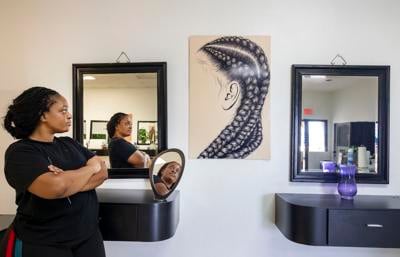A Baton Rouge judge was correct in dismissing a Louisiana salon owner’s lawsuit that aimed to throw out the state’s 500-hour training mandate for professional hair braiders, the First Circuit Court of Appeal has ruled.
Ashley N’Dakpri filed a 2019 lawsuit that sought an injunction to stop the Louisiana State Board of Cosmetology from making aspiring stylists undergo at least 500 hours of training, pass a written exam and complete a practical test before they earn an “alternative hair design” permit that licenses them to legally braid hair professionally.
During a bench trial last July, District Judge Wilson Fields dismissed N’Dakpri’s lawsuit, finding that she failed to prove the occupational regulation was unnecessarily onerous and barred braiders from getting into the profession.
On Friday, a trio of appellate judges agreed with Fields and affirmed his decision to dismiss N’Dakpri’s constitutional and statutory challenges.
“While Ms. N'Dakpri testified that the 500-hour requirement is excessive and that she cannot afford to spend time away from her business to obtain the permit, she offered no evidence as to the specific amount of training that should be deemed necessary,” stated the order from First Circuit judges Jewel Welch, Elizabeth Wolfe and Tess Stromberg.
The Institute for Justice, a nonprofit Washington, D.C., think tank, vowed to appeal the decision to the Louisiana Supreme Court in a statement Monday.
“Obviously Friday’s ruling is incredibly disappointing, but we remain committed to making sure that braiders in Louisiana can work without spending thousands of dollars and hundreds of unnecessary hours at beauty school, particularly when their job doesn’t involve dangerous things like chemicals,” said Keith Neely, an attorney for the legal team that has represented N’Dakpri. “All Americans have the right to earn an honest living without jumping through unreasonably burdensome hoops.”
The State Board of Cosmetology, made up of eight hair care experts appointed by the governor, was formed in 2003 to protect barbershop and salon patrons from bacterial infections and cross contamination. State officials say the alternative hair design permit is necessary to preserve public health and safety at licensed salons offering braiding services.
Salon owners caught operating with unlicensed braiders can be shut down and face being fined up to $5,000 fine for each violation.
Citing the fact that 33 states have no licensing requirements for braiders, critics of the measure say it is a money grab that forces up-and-coming braiders to choose between operating underground, leaving Louisiana or completing an unnecessary curriculum to get certified.
House Rep. Mike Bayham, R-Chalmette, sponsored a bill this year that proposed removing the licensing and educational requirements, but it died at the committee level. Bayham said he intends to refile the bill during next year’s legislative session.
Braiding is an increasingly popular hairstyling technique deeply rooted in African culture. Braiding natural hair requires only a comb, grease, a braiders’ fingers and hair extensions. It is considered a less invasive approach than more traditional hairstyles that often require heat, scissors and straightening chemicals that can cause scalp burns and damage coily locks.
N’Dakpri is a West African immigrant who learned from relatives how to braid hair at a young age. Her aunt moved to Louisiana and opened Afro Touch salons in four locations across the state. She had 20 employees, but had to scale down to a single shop in Gretna after state inspectors began cracking down on unlicensed braiders in the stores. N’Dakpri said she has been fined thousands of dollars for violations since she took over the last remaining Gretna salon in 2019.
During last July’s bench trial, N’Dakpri testified that she completed between 1,000 and 1,200 hours of training to receive her cosmetology license in the Ivory Coast before moving to the U.S. She said she began the process of having the licensing from her native country transferred to Louisiana, but stopped when the lawsuit was filed.
The cosmetology board argued the plaintiffs never lodged a grievance with it before filing their civil action in court. Judge Fields gave N’Dakpri and her aunt 90 days to file a petition with the cosmetology board, a requirement under state law when challenging the occupational licensing requirements of a regulatory agency. When the plaintiffs indicated such a petition would be futile, Judge Fields dismissed one of their statutory claims in April 2023, the appellate court noted.
“Generally, a person aggrieved by an action must exhaust all available administrative remedies provided before being entitled to judicial review,” appeals judges wrote in their order affirming Fields. “The function of the exhaustion doctrine is to give the body whose decision is under attack an opportunity to review, supplement, and, if necessary, correct its decision.”
After hearing testimony last July, Fields dismissed the other claim, determining N’Dakpri didn’t present a preponderance of evidence that the cosmetology board violates the constitution with its licensing restrictions.
“I want to employ additional braiders at my shop so I can grow this business and braid more people’s hair, but the state’s rules have made it so braiders are either working in other states or quitting the field altogether,” N’Dakpri said in a statement Monday. “That’s why I plan to bring this lawsuit to the Louisiana Supreme Court.”

